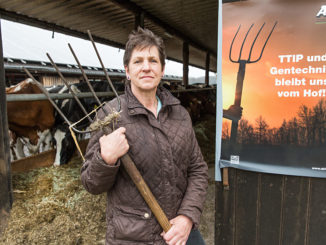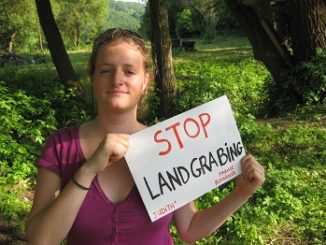
Written By: Ramona Duminicioiu, Agrobiodiversity Campaign Coordinator for Eco Ruralis
Eco Ruralis has launched a campaign called ‘TTIP / CETA Free Zones in Romania’ to persuade local municipalities to support the growing citizens’ opposition to the Transatlantic Trade and Investment Partnership (TTIP) and the Comprehensive Economic and Trade Agreement (CETA). The newly launched campaign is advocating for the potential negative impact of TTIP / CETA on the future of agriculture, food sovereignty, local economy and worker’s rights.
Romania is a country with a vibrant rural area, comprising 47.2% of the population (the highest percentage of rural population in the EU), totaling 8.98 million inhabitants. The 4.7 million active peasants (representing ~50% of peasants in the EU) who practice small scale family farming, are feeding a significant portion of the urban population. The social impact of TTIP / CETA in this country would threaten the very existence of millions of peasants.
Dan Cismaş is a peasant farmer in Transylvania and a member of Eco Ruralis.
Local municipalities in Romania have a closer relation to citizens and rural reality. We hope that they understand the need to take a stand locally and to join other hundreds of local authorities from around Europe, who declared their opposition to TTIP and CETA. Together, we can grow the movement and protect local farmers and consumers from the ‘big business’ agenda. The time has come for local authorities to take a stand against this problem and to express their worries against the risks posed by the two trade agreements. This is essential for sustainable rural development at local and regional level.
TTIP and CETA are not deals made for the benefit of small farmers, citizens, consumers, workers or small businesses. At its heart, TTIP includes a mechanism (called Investor-State Dispute Settlement – ISDS) which will allow big corporations to sue any government for damaging their profit line – even when the government is attempting to protect people and their health.
The ‘TTIP / CETA Free Zones’ concept refers to a public statement which shows the opposition of various actors from society against these trade agreements. By declaring a zone ‘TTIP / CETA Free’, the local authorities are officially expressing their concerns regarding the social and the legal consequences of their implementations. This declaration is a democratic way to put pressure on the Romanian Government and the relevant European authorities (European Parliament and the European Commission) to stop TTIP and CETA negotiations.
Model of Declaration for TTIP / CETA Free Zones in Romania
-
The municipality / city / commune …………………………………. is officially declaring its concerns and opposition to the Transatlantic Trade and Investment Partnership (TTIP) and the Comprehensive Economic and Trade Agreement (CETA), which are currently being negotiated by the European Union and the USA.
-
The undersigned municipality / city / commune will commit to inform the local population with regards to the negative impact of TTIP / CETA on the market, food safety and food security, employment standards, the protection of the environment and public services – including education, health and social welfare.
-
The undersigned municipality / city / commune considers that TTIP / CETA will negatively impact sustainable development at the local and regional level throughout Europe. Therefore,we request all the relevant decision makers in Romania and the EU – the Romanian Government, the European Parliament and the European Commission – to protect the interest of farmers, workers and consumers and to stop TTIP and CETA negotiations.
The current efforts made by European Civil Society, to put pressure on the European Commission through a self organized petition, need to be complemented by a strong and strategic mobilization at the local level. Thousands of Romanian citizens have already signed the self organized petition against these treaties. Their message needs to be multiplied on a larger scale. The TTIP / CETA Free Zones campaign is also calling for support from other local actors such as: schools, civil society organizations, small local businesses, groups of producers, farmers, churches, hospitals and anyone who feels that they can contribute to the movement.
More
ARC2020 briefing notes on TTIP
ARC2020 news stories on TTIP
Central and Eastern European countries at the crossroads
TTIP free zones (Global Justice Now)
TTIP free zones in six EU countries




